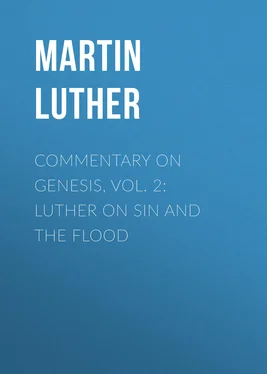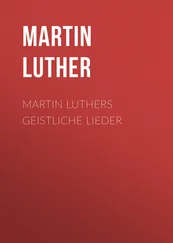Martin Luther - Commentary on Genesis, Vol. 2 - Luther on Sin and the Flood
Здесь есть возможность читать онлайн «Martin Luther - Commentary on Genesis, Vol. 2 - Luther on Sin and the Flood» — ознакомительный отрывок электронной книги совершенно бесплатно, а после прочтения отрывка купить полную версию. В некоторых случаях можно слушать аудио, скачать через торрент в формате fb2 и присутствует краткое содержание. Жанр: foreign_prose, foreign_religion, Философия, foreign_psychology, foreign_antique, на немецком языке. Описание произведения, (предисловие) а так же отзывы посетителей доступны на портале библиотеки ЛибКат.
- Название:Commentary on Genesis, Vol. 2: Luther on Sin and the Flood
- Автор:
- Жанр:
- Год:неизвестен
- ISBN:нет данных
- Рейтинг книги:4 / 5. Голосов: 1
-
Избранное:Добавить в избранное
- Отзывы:
-
Ваша оценка:
- 80
- 1
- 2
- 3
- 4
- 5
Commentary on Genesis, Vol. 2: Luther on Sin and the Flood: краткое содержание, описание и аннотация
Предлагаем к чтению аннотацию, описание, краткое содержание или предисловие (зависит от того, что написал сам автор книги «Commentary on Genesis, Vol. 2: Luther on Sin and the Flood»). Если вы не нашли необходимую информацию о книге — напишите в комментариях, мы постараемся отыскать её.
Commentary on Genesis, Vol. 2: Luther on Sin and the Flood — читать онлайн ознакомительный отрывок
Ниже представлен текст книги, разбитый по страницам. Система сохранения места последней прочитанной страницы, позволяет с удобством читать онлайн бесплатно книгу «Commentary on Genesis, Vol. 2: Luther on Sin and the Flood», без необходимости каждый раз заново искать на чём Вы остановились. Поставьте закладку, и сможете в любой момент перейти на страницу, на которой закончили чтение.
Интервал:
Закладка:
125. Although Adam and Eve in paradise did not deny their sin, yet their confession was lukewarm, and the sin was shifted from the one to the other. Adam laid it on Eve, and Eve on the serpent. But Cain went even farther, for he not only did not confess the murder he had committed, but disclaimed responsibility for his brother. And did not this at once prove his mind to be hostile against his brother? Therefore, though Adam and Eve made only a half-hearted confession, they had some claim to pardon, and in consequence were punished with less severity. But Cain, because he resolutely denied his sin, was rejected, and fell into despair.
And the same judgment awaits all the sons of Cain, popes, cardinals, and bishops, who, although they plan murder against us day and night, say likewise, "I know not: Am I my brother's keeper?"
126. There was a common proverb of old, "What is it to the Romans that the Greeks die?" So we think that our dangers and calamities only belong to ourselves. But how does this principle agree with the commandment of God? For his will is that we should all live together, and be to each other as brethren. Cain, therefore, by this very saying of his, heavily accuses himself when he makes the excuse that the custody of his brother was no affair of his. Whereas, if he had said to his father, "Alas, I have slain Abel, my brother. I repent of the deed I have done. Return upon me what punishment thou wilt," there might have been room for a remedy; but as he denied his sin, and, contrary to the will of God, disclaimed responsibility for his brother altogether, there was no place left for mercy or favor.
127. Moreover, Moses took special pains in the preparation of this account, that it might serve as a witness against all hypocrites, and as a chronicle containing a graphic description of their character and of the ire to which they are aroused by Satan against God, his Word and his Church. It was not enough for this murderer that he had killed his brother, contrary to the command of God, but he added the further sin that he became filled with indignation and rage when God inquired of him concerning his brother. I say, "when God inquired of him," because, although it was Adam who spoke these words to his son Cain, yet he spoke them by the authority of God and by the Holy Spirit. In view of so great a sin, was it not quite gentle to inquire, "Where is Abel thy brother?" And yet, to this word, which contained nothing severe, the hypocrite and murderer is ferocious and proud enough to reply, "I know not." And he is indignant that he should be called to an account concerning the matter at all. For the reply of Cain is the language of one who resists and hates God.
128. But to this sin Cain adds one still worse. Justly under indictment for murder, he presently becomes the accuser of God, and expostulates with him: "Am I my brother's keeper?" He prefaces his reply with no such expression of reverence or honor as is due both to God and to his father. He did not say, "Lord, I know not." He did not say, "My Father, didst thou make me the keeper of my brother?" Such expressions as these would have indicated a feeling of reverence toward God or toward his parent. But he answers with pride as if he himself were the Lord, and plainly manifests that he felt indignation at being called to account by him who had the perfect right to do so.
129. This is a true picture of all hypocrites. Living in manifest sins, they grow insolent and proud, aiming all the while to appear righteous. They will not yield even to God himself and his Word when upbraided by them. Nay, they set themselves against God, contend with him, and excuse their sin. Thus David says, that God is judged of men, but that at length he clears and justifies himself, and prevails, Ps 51, 4. Such is the insolence of the hypocrites Moses has here endeavored to paint.
130. But what success has Cain with his attempt? This, that his powerful effort to excuse himself becomes a forcible self-accusation. Christ says, "Out of thine own mouth will I judge thee, thou wicked servant," Lk 19, 22. Now, this servant wished to appear without guilt, saying: "I knew thee that thou art a hard man, reaping where thou didst not sow; and I was afraid, and hid thy talent," Mt 25, 24-25. Could he have brought a stronger accusation against himself, in view of the fact that Christ immediately turns his words against him? Thereby Christ evidences the wisdom of the Holy Spirit.
131. Such illustrations help us to learn not to contend with God. On the contrary when you feel in your conscience that you are guilty, take heed with all your soul that you strive neither with God nor with men by defending or excusing your sin. Rather do this: When you see God point his spear at you, flee not from him; but, on the contrary, flee to him with a humble confession of your sin, and with prayer for his pardon. Then God will draw back his spear and spare you. But when, by the denial and excuse of your sin, you flee farther and farther from him, God will pursue you at close range with still greater determination, and bring you to bay. Nothing, therefore, is better or safer than to come with the confession of guilt. Thus it comes to pass that God's victory becomes our victory through him.
132. But Cain and hypocrites in general do not this. God points his spear at them, but they never humble themselves before him nor pray to him for pardon. Nay, they rather point their spear at God, just as Cain did on this occasion. Cain does not say, "Lord, I confess I have killed my brother; forgive me." On the contrary, though being the accused, he himself accuses God by replying, "Am I my brother's keeper?" And what did he effect with his pride? His reply was certainly equal to the confession that he cared naught for the divine law, which says, "Thou shalt love thy neighbor as thyself," Lev 19, 18. And again, "Do not unto another that which you would not have another do unto you," Mt 7, 12. This law was not first written in the Decalog; it was inscribed in the minds of all men. Cain acts directly against this law, and shows that he not only cares nothing for it, but absolutely despises it.
133. In this manner, Cain represents a man who is not merely wicked, but who occupies such a height of wickedness as to combine hypocrisy with bloodshed, and yet is so eager to maintain the appearance of sanctity that he rather accuses God than concedes the justice of the accusation against himself. And this is what all hypocrites do. They blaspheme God and crucify his Son, and yet wish to appear righteous. For after their sins of murder, blasphemy and the like their whole aim is to seek means whereby to excuse and palliate the same. But the result always is that they betray themselves and are condemned out of their own mouths.
134. While Cain makes an effort to clear himself, he exhibits the foulest stains. He thinks he made a most plausible excuse when he said, "Am I my brother's keeper?" But this very excuse becomes his most shameful accusation. The maxim of Hilary, that wickedness and stupidity always go hand in hand, finds unvarying application. If Cain had been as wise as he was wicked, he would have excused himself in quite a different manner. Now, under the operation of the divine rule that wickedness and stupidity are running mates, he becomes his own accuser. The same principle operates in favor of the truth, and makes her defense against all adversaries easy. Just as Cain betrayed by word and mien his indifference and hate toward his brother, so all adversaries of the truth betray their wickedness, the one in this way, the other in that.
135. Facts of importance and apt for instruction are, therefore, here set before us. And their general import is that God does not permit hypocrites to remain hidden for any length of time, but compels them to betray themselves just when they make shrewd efforts to hide their hypocrisy and crime.
Читать дальшеИнтервал:
Закладка:
Похожие книги на «Commentary on Genesis, Vol. 2: Luther on Sin and the Flood»
Представляем Вашему вниманию похожие книги на «Commentary on Genesis, Vol. 2: Luther on Sin and the Flood» списком для выбора. Мы отобрали схожую по названию и смыслу литературу в надежде предоставить читателям больше вариантов отыскать новые, интересные, ещё непрочитанные произведения.
Обсуждение, отзывы о книге «Commentary on Genesis, Vol. 2: Luther on Sin and the Flood» и просто собственные мнения читателей. Оставьте ваши комментарии, напишите, что Вы думаете о произведении, его смысле или главных героях. Укажите что конкретно понравилось, а что нет, и почему Вы так считаете.












